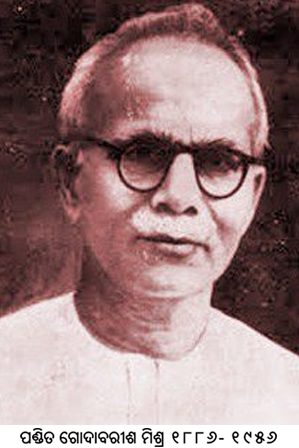Born :- 26-Oct-1886
Died :- 26-Jul-1956
Place of Birth :-

Doyen of Odialiterature, poet of Kalijai fame, educationist, patriot and ardent social reformer, journalist and progressive political leader Pandit Godabarish Mishra was born on 26 October, 1886 to parents Lingaraj Mishra and Apsara Devi in SrinibaspurSasan near Banapur in the undivided Puri district. He had his primary education from the village school and received his higher education from the Puri District School in 1906. Godabarish did his B.A. in Philosophy in 1910 from Ravenshaw College, Cuttack and Post-graduation in economics from the University of Calcutta in 1912.
Influenced by the ideals of UtkalmaniPanditGopabandhu Das, Godabarishjoined as a teacher in the SatyabadiBanaBidyalaya in 1913 and, in 1919, proceeded toChakradharpur High School in the Singhbhum district (Now in Jharkhand) to join there as headmaster till 1921. He was sent there by Utkalmani with the aim of preserving the Odia language.Meanwhile, he not only took part in the non-cooperation movement, but also led the campaigns in Chakradharpur and its adjacent areas. By the time UtkalmaniPanditGopabandhu Das was arrested and jailed in 1922, Chakradharpur High School had evolved into a national-level model school at par with the SatyabadiBanaBidyalaya.
Godabarishreturned to his native village in 1922 with high hopes for ground-level constructive work and established new schools, small-scale industries and social welfare organisations for all round development of the area to set it as a model for others to follow. Although he belonged to a conservative Brahmin family, he was a socialist by nature and was against caste discrimination. He didn't wear his sacred thread and also wore a moustache, which was against the Brahmin traditions.
In 1928 he became Editor of The Samaja, Odisha’s premiernewspaper, following the death of its founder Gopabandhu, managing the responsibility efficiently for two years.
PanditGodabarish was associated with UtkalSammilani from 1919 to 1955. He was the President of the UtkalSamilani Special Conference held at Berhampur in 1955.
Inspired by Mahatma Gandhi and Pandit Gopabandhu Das, he joined the Congress party and was a member of the VidhanSabha (Lower House) of the Odisha Legislative Assembly.He was the member of the district board from 1924 to 1933. He was a member of OdishaVidhanSabha from 1937 till his death, with the exception of a five-year break. He became a VidhanSabha member in 1952 as an independent candidate and served the duties of a responsible member of the opposition. He served as Finance and Education minister in the ministry of the Maharaja of Parlakhemundi from 1941 to 1944. During this period heplayed an important role in the establishment of Utkal University, Cuttack High court and various colleges in Puri, Baleshwar and Sambalpur.
Besides his two years of work as Editor of the ‘Samaj’, he published and edited the magazine ‘Lokamukha’ from Banapur in 1924. He also used to write for the ‘Eastcoast’ published by SashiBhusanRath. He was awarded doctorate in literature from Utkal University.
His autobiography ‘Ardha-SatabdiraOdisha o Tahinre Mo Sthana’ is a contemporary history of the state. In view of the simple and fearless expression of truth,it has earned a special place like theautobiography ofFakir Mohan Senapatiamong all Odia autobiographies written so far.
As a poet, writing ballads was his forte. ‘Alekhika’, a compilation of his ballads contains 10 such poems including the famous ‘Kalijai’, is the most precious contribution of Godabarish to Odia literature. The poems are based on history andlegend and are a complete reflection of his romantic persona, according to DrMayadharMansingh.
Hundreds of his lyrical poems are published in the collections like ‘Chayanika’, ‘Kalika’, ‘Kusuma’,‘Geetayana’ and ‘GeetiGuchha’. These poems betray a touching picture of his tragic and sorrowful experiences in a tone vibrating with humanity.
Although he tried his hand at plays, two books, PurushottamDev and MukundaDev written in 1917 and 1920 respectively, were stage flops. However, the theme of nationalism less found in his lyrical poems has found expression in these two works.
His stories compiled under the title ‘Puanighara’ are based on themes ranging from the splendour andperdition of woman’s life to generational contradictions and reforms.
PanditGodabarish has also authored four novels, ie. ‘Ghatantar’, ‘Abhagini’, ‘AtharaSahaSatara’ and ‘Nirbasita’.‘Abhagini’ deals with the conflicts of Banki and Khurdha with the British army 1840 while ‘AtharaSahaSatara’ is a description of the Paika mutiny of Khurdha against the British and the selfless patriotism of BuxiJagabandhu and his dedication.
PanditGodabarish Mishra was posthumously honoured with the Kendra Sahitya Academy Award in 1961.
